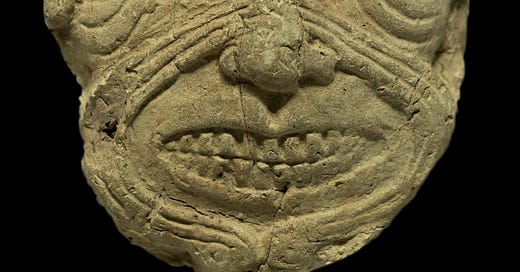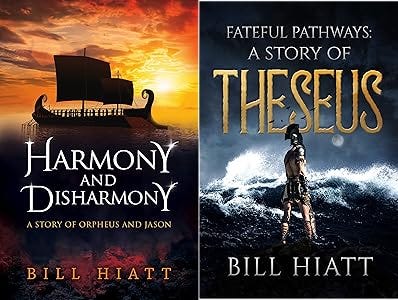Need to read an earlier episode first? Click the button to get a complete list, with the oldest at the bottom.
Gilgamesh and Enkidu reached the cedar forest. In the center of it, a mountain ominously reminiscent of the one in Gilgamesh’s dream thrust toward the sky. It was no wonder that some people thought of the place as a gateway to the home of the gods or as the throne of Inanna, the goddess of love and war.
The cedar trees were the tallest either man had ever seen. Even in all his wanderings in the wilderness, Enkidu had never seen their like. Cedar wood was rate—close to priceless in Uruk—but here it was abundant. No wonder Enlil had assigned a guardian to watch over it.
The trees grew close together. At their well-shaded bases, thorn bushes grew so thickly that no mortal could walk among them. The only choice was to walk up the path, toward the mountain.
The path that the gigantic Huwawa patrolled. Was that sound of thunder in the distance really just his footsteps?
Enkidu had tried to be brave because he knew it was what Gilgamesh wanted—what the gods wanted. But now, faced with what he knew lay ahead, he would rather fling himself into the thorns and let his body be torn to pieces than to face the patrolling giant.
“My brother, let us flee while we still can. My strength has deserted me. I now know only weakness. I shudder when I think of Huwawa’s face, so like that of a lion, and his teeth, so like those of a dragon. He could sweep us away as the Great Flood swept away whole forests.”
Gilgamesh, still haunted by the terror he had felt in his dreams, wanted to take Enkidu’s advice. But what would the people of Uruk think if he back down after giving them such sweeping promises? What would his enemies think?
“Fear not, Enkidu, for the gods have given us guarantees of success. If we stand together, no harm can come to us. Let us advance like wild bulls, not skulk away like cowards.”
Perhaps Utu heard an uncertainty in Gilgamesh’s voice. Would he and Enkidu refuse their destiny and flee at the last minute? The sun god could not allow that to happen.
In a voice that thundered from the heavens, Utu said, “Hurry, for Huwawa is now vulnerable. He is not in the heart of the cedar forest, and he wears only one of his seven enchanted cloaks. Strike now, and you will be victorious.”
Gilgamesh’s fear faded in the warm sunlight coming down through the cedar branches. He had the personal assurance of a god. What more did he need?
Enkidu remained unconvinced, but even if he wished to, he could not abandon Gilgamesh. Enkidu would honor his oath to Ninsun. He would heed his love for Gilgamesh. Even if faced by death itself, Enkidu could not turn back now.
Together, they unsheathed their spears and raised their axes. But before they had time to do much, Huwawa, who had long since sensed their presence, came thundering down the path, eager to put these intruders to flight, or, if they refused to flee, to tear them to pieces.
“Gilgamesh!” he roared. “How foolish of you to take the advice of this beast man, this motherless creature. Long did I observe him when he lived among the beasts. I could have killed him then and swallowed him in one bite. I could do the same now.”
“What advice I take comes not from Enkidu but from the gods themselves,” replied Gilgamesh, whose voice was firm, even though his heart trembled.
“Yet it was the gods themselves you put me here as guard,” said Huwawa. No one who looked upon him could doubt that. His gigantic form cast a long shadow over Gilgamesh and Enkidu. His face was fierce as that of a hungry lion. His eyes glared at them like those of a predator who has sighted easy prey.
Gilgamesh took a moment to pray to Utu for victory. Only then did he nod to Enkidu. Without warning, both of them charged the gigantic guardian.
He was strong as a mountain. But Gilgamesh was more god than man, and Enkidu carried within himself the forces of nature and the courage of Ninurta.
When they collided, the entire cedar forest shook. Large mountains broke into smaller ones. The soil beneath their feet cracked, and great chasms formed nearby. Dust clouds surrounded them, blotting out the sun.
It was then that Utu, true to his word—at least at that moment—raised the winds of north, south, east, and west. But they didn’t just blow. They formed hurricanes that devastated anything in their path. Against such storms, even Huwawa could not advance.
Gilgamesh and Enkidu, miraculously shielded from the tornados that tore relentlessly at their foe, thrust with their swords and cut with their axes. The guardian kept them at bay for as long as he could, but eventually, they felled him like a cedar tree. They shattered him as their fight had shattered mountains. He was at their mercy.
“Spare me,” said Huwawa, his voice barely more than a harsh whisper. “For was I not appointed to my post by Enlil, master of air, earth, and water? And have I not performed only my task, and no more? For I could have struck you down the moment you entered the forest. I could have torn your flesh to pieces and fed it to crows and vultures. But instead, I gave you fair warning.
“Rather than kill me, let me be your servant. Spare me, and I will cut down as many cedar trees as you wish. From them, I will fashion a palace such as no mortal has ever seen. You will live within its walls, and I will guard you as well as I guard the the cedar forest.”
“I did not at first want this quest,” Enkidu said to Gilgamesh. “But now that we have come this far and defeated Huwawa, should we leave him alive? It is said that no man can trust a fallen enemy—unless he is a dead one.”
“But killing me is surely an affront to the god who appointed me, is it not? Gilgamesh, you are mighty, but can even you withstand the wrath of Enlil? Would Utu, who intervened to save you today, dare to do so if Enlil stood against you?”
Gilgamesh’s heart beat faster and his fist clenched at the thought that Huwawa was mocking him—even though it was true that the king could not have triumphed over the guardian without Utu’s aid.
Enlil’s wrath was something to consider. But the gods often worked through mortals or other servants when they could. Would not Enlil already be angry with Gilgamesh? And would not Huwawa make a perfect instrument of vengeance in such a case? Surely, it was better kill Huwawa. Enlil might not be able to find another such champion easily and might be reluctant to get his own hands dirty. In any case, Gilgamesh was not without divine allies himself. Surely, Enlil would not create discord among the gods by striking down Gilgamesh himself.
In the heat of anger, mortals often make rash decisions. So did Gilgamesh as he raised his axe to strike.
“You will slay me?” asked Huwawa. “Then I curse you—both of you—with my dying breath. You have had happiness in life—but no more! The remainder of your lives will be filled with conflict. Enkidu will die soon—very soon—and the remainder of Gilgamesh’s life will be devoured by grief. Hear me, Enlil, and fulfill my curse.”
Furious, Gilgamesh struck at Huwawa’s neck with his axe. The execution required three blows to sever the giant’s head from his body. Then the head rolled downhill like a boulder, and a river of blood washed across the pathway. The mountains themselves cried out at the sight, and rain poured down from the heavens as if the gods themselves wept for Huwawa.
Even after the rain subsided, the sky looked cloudy, but Gilgamesh paid no attention. One by one, he chopped down cedar trees. One by one, Enkidu shaped them into lumber.
“Let us take this lumber and make a sacred door,” said Enkidu. “One through which only a god can enter. Then let us build a cedar raft and float the door down the Euphrates to Nippur, city of Enlil. If we give such a magnificent gift to Enlil, he will be more likely to forgive us for the battle with Huwawa. His forgiveness will wash away our guilt, just as the rain has washed away the blood of the guardian.”
Gilgamesh smiled for the first time in hours and helped Enkidu implement his suggestion. The door they created for Enlil’s temple was far greater than any door made by mortal hands up until that point. But even as they sailed the door down the Euphrates on their cedar raft, the sky remained cloudy.
Enlil looked down on them from above those very clouds. He noticed, as Gilgamesh did not and Enkidu refused to, that there was blood on the cedarwood.
Huwawa’s words still echoed in Enlil’s ears. He would not soon forget them.
Today is the last day to buy the two books below while their sale prices are still in effect. Myth lovers, don’t miss out!
Read the first episode of my series based on Greek mythology here:
Menippus and the Stranger
(This tale is inspired by a section in the Life of Apollonius by Philostratus.)










FELICES Y GRACIAS
GRACIAS Y FELICES